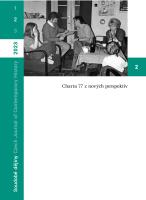Minulé budoucnosti československé ekonomické transformace
Past Futures of Czechoslovak Economic Transformation
Author(s): Matěj MoravanskýSubject(s): History, Economic history, History of ideas, Political history, Transformation Period (1990 - 2010), Post-Communist Transformation, Book-Review
Published by: AV ČR - Akademie věd České republiky - Ústav pro soudobé dějiny
Keywords: Czechoslovakia;post-communism;economic transformation;economic democracy;economic liberalism;neoliberalism;corporate self-management;voucher privatization;Václav Klaus
Summary/Abstract: In his monograph "Trh bez přívlastků, nebo ekonomickou demokracii? Spory o podobu vlastnické transformace v porevolučním Československu" [A Market without Attributes, or Economic Democracy? Disputes over the Form of Property Transformation in Post-revolutionary Czechoslovakia], the historian Václav Rameš deals with the discussions and conceptual disputes on the form of economic transformation in post-communist Czechoslovakia in the early 1990s. In this, a group of liberal politicians and economists led by the then federal Finance Minister Václav Klaus came to the fore with a programme of rapid and massive expropriation of economic enterprises in the form of voucher privatisation (kuponová privatizace). The reviewer highlights the fact that the author, as a historian, and unlike the actors, witnesses and majority of discussants of the period, approaches the topic with a perspective unburdened by the subjective comparisons of the reality of the time with the optimal state. Instead, in a matter-of-fact way, he reconstructs the competing ideas of transformation during the dynamic post-revolutionary events and analyses the domestic and external reasons for their success or failure. He also traces the continuity and rapid demise of contemporary ideas of economic democracy that were to be fulfilled through corporate self-management. Rameš knowledgeably relates the Czechoslovak case to the parallel developments in other postcommunist countries and to the global context of the rise of economic neoliberalism. He works with the concept of “past futures”, in reference to the German historian of ideas Reinhart Koselleck, to portray possible but not realized trajectories of development in the past, thus acknowledging that the shape of the transformation was not predetermined and could have evolved differently.
Journal: Soudobé Dějiny
- Issue Year: XXX/2023
- Issue No: 2
- Page Range: 616-625
- Page Count: 10
- Language: Czech

